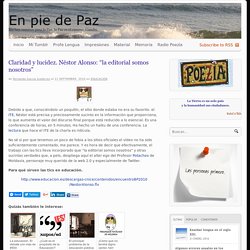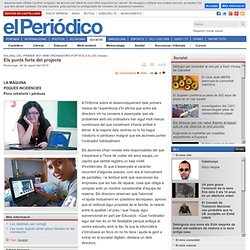

Impresion(antes): Rúbricas. Mon @ Centre de Cultura Contemporània de Barcelona (CCCB) MonVall : Els # keepcalm dels alumnes... Untitled. PURPOS/ED. Claridad y lucidez. Néstor Alonso: “la editorial somos nosotros” Debido a que, conociéndolo un poquitín, el sitio donde estaba no era su favorito: el ITE, Néstor está precisa y preciosamente sucinto en la información que proporciona, lo que aumenta el valor del discurso final porque está reducido a lo esencial.

Es una conferencia de horas, en 5 minutos. Ha hecho un haiku de una conferencia. La lectura que hace el ITE de la charla es ridícula. No sé si por que tenemos un poco de fobia a los sitios oficiales el vídeo no ha sido suficientemente comentado, me parece. Y es hora de decir que efectivamente, el trabajo con las tics lleva incorporado que “la editorial somos nosotros” y otras sucintas verdades que, a pelo, despliega aquí el alter ego del Profesor Potachov de Moldavia, personaje muy querido de la web 2.0 y especialmente de Twitter.
Para qué sirven las tics en educación. Si quieres, puedes compartirlo. BALANÇ DEL PRIMER ANY AMB ORDINADORS PORTÀTILS A LES CLASSES Els punts forts del projecte. LA MÀQUINA POQUES INCIDÈNCIES Pocs robatoris i pèrdues Edició Impresa Versió en .PDF Informació publicada en la página 22 de la secció de cv Sociedad de l'edició impresa del dia 29 de agost de 2010 VEURE ARXIU (.PDF) A l'informe sobre el desenvolupament dels primers mesos de l'experiència s'hi afirma que entre els directors «hi ha consens a assenyalar que els problemes amb els ordinadors han sigut molt menys nombrosos del que inicialment s'havia arribat a témer.

A la majoria dels centres no hi ha hagut robatoris ni pèrdues» malgrat que els alumnes porten l'ordinador habitualment. Els alumnes s'han revelat més responsables del que s'esperava a l'hora de cuidar els seus equips, un capítol que també registra un baix nivell d'incidències. L'APRENENTATGE BONES PERSPECTIVES Buscar un altre tipus d'avaluació Encara és aviat per poder jutjar si els ordinadors milloren el rendiment acadèmic dels estudiants, però les perspectives són, segons l'opinió dels enquestats, «engrescadores».
Automatic translator. 7 Very fun games that are actually good for your brain. By Smartkit Thursday, July 23, 2009 Prior to the emerging of Sudoku as global phenomena in 2005, some of us have made the mistake in believing we can keep our minds sharp by merely doing crossword puzzles. By 2009 most of us realize true cognitive fitness stems from immersing your mind in a wide variety of challenges and puzzle types. Yet, no matter the particular type of brain activity each game is designed for, in order to succeed all brain games should comply with the very first rule of every gaming experience: being very fun. The following are 7 creative and highly original casual games that go beyond mere testing hand-eye-coordination, and are guaranteed to sharpen your mind while kicking your brain into high gear. The list was compiled by the puzzle lovers at Smartkit.
Sprout This short but endearing puzzle adventure by Jeff Nusz of custom-logic.com features a tiny seed pod that must work its way across beautiful hand drawn landscapes. Play Sprout (Smart-kit.com) Splitter Pickies 1. In the Future, the Cost of Education will be Zero. The average cost of yearly tuition at a private, four-year college in the US this year was $25,143, and for public schools, students could expect to pay $6,585 on average for the 2008-09 school year, according to the College Board . That was up 5.9% and 6.4% respectively over the previous year, which is well ahead of the national average rate of inflation . What that means is that for many people, college is out of reach financially.
But what if social media tools would allow the cost of an education to drop nearly all the way down to zero? Of course, quality education will always have costs involved — professors and other experts need to be compensated for their time and efforts, for example, and certain disciplines require expensive, specialized equipment to train students (i.e., you can’t learn to be a surgeon without access to an operating theater). The University of the People One vision for the school of the future comes from the United Nations. A Radical Idea: Free Textbooks.